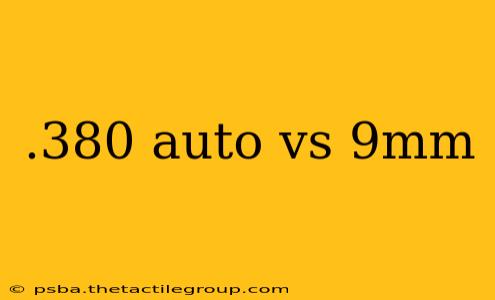Choosing the right caliber for self-defense or concealed carry is a crucial decision, and the debate between the .380 ACP (Automatic Colt Pistol) and the 9mm often tops the list. Both are popular choices, but their performance characteristics differ significantly, impacting their suitability for various situations and individual preferences. This in-depth comparison will explore the key differences, helping you make an informed choice.
Ballistics: Power and Penetration
The most significant difference between the .380 ACP and 9mm lies in their ballistic performance. The 9mm round delivers substantially more energy and stopping power. This translates to a greater likelihood of incapacitating a threat with fewer shots.
-
9mm: Generally packs more kinetic energy upon impact, resulting in greater penetration and a wider wound channel. This is critical for overcoming obstacles like clothing and potentially stopping a threat quickly.
-
.380 ACP: While easier to control and manage recoil, it offers less stopping power. Its smaller size and lighter bullet mean it may require more accurate shot placement and potentially more rounds to neutralize a threat. Penetration can also be an issue, particularly against thicker clothing or barriers.
Recoil and Shootability
Recoil is another key factor to consider, especially for individuals new to firearms or those with smaller builds.
-
.380 ACP: Known for its manageable recoil, making it easier to control and shoot rapidly. This is a significant advantage for those prioritizing ease of use and quick follow-up shots.
-
9mm: Exhibits greater recoil, which can be challenging for beginners. While manageable with practice, it requires more strength and control to maintain accuracy during rapid firing.
Concealability and Carry
Concealability is often a primary concern for those choosing between these calibers, particularly for concealed carry.
-
.380 ACP: Its smaller size and lighter weight make it ideal for ultra-compact pistols designed for deep concealment. Smaller firearms are often easier to carry comfortably and discreetly.
-
9mm: While still concealable in various handgun models, the 9mm typically requires a slightly larger firearm for reliable function. However, advancements in modern pistol design have produced increasingly slim 9mm handguns suitable for concealed carry.
Ammunition Availability and Cost
Accessibility and cost are also important practical considerations.
-
9mm: Widely available and relatively inexpensive compared to .380 ACP ammunition. This makes it a more economical choice for regular practice and training.
-
.380 ACP: While readily available, ammunition can be slightly more expensive and may have less variety in terms of bullet types and manufacturers.
Conclusion: Which Caliber is Right for You?
The ideal caliber depends heavily on individual needs and priorities.
-
Choose .380 ACP if: You prioritize ease of handling and ultra-compact concealability, and you're comfortable with a potentially less powerful round. This is a good option for beginners or individuals with physical limitations affecting recoil management.
-
Choose 9mm if: Stopping power and penetration are your primary concerns. You're willing to invest time in practicing to manage the recoil and are comfortable carrying a slightly larger firearm.
Ultimately, the best way to decide is to rent or borrow both calibers and test them at a shooting range. This allows you to personally experience the recoil, accuracy, and overall feel of each, helping you make a more informed and confident decision based on your specific needs and abilities. Remember to always prioritize safe firearm handling and responsible gun ownership.

